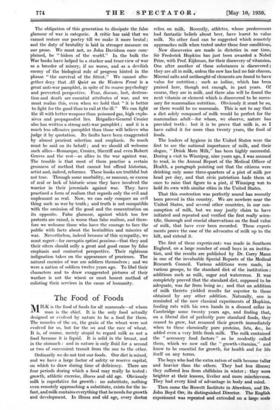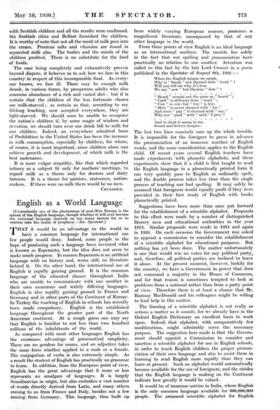The Food' of Foods
MILK is the food foods for all mammals—of whom - od man is the chief. It is the only food actually designed or evolved by nature to be a food for them. The muscles of the ox, the grain of the wheat were not evolved for us, but for the ox and the race of wheat. It is, of course, merely stupid to regard milk as not a food because it is liquid. It is solid in the breast, and in the stomach : and in nature is only fluid for a second or two of convenient transit from the one to the other.
Ordinarily we do not test our foods. Our diet is mixed, and we have a large factor of safety or reserve capital, on which to draw during time of deficiency. There are four periods, during which a food may really be tested : growth, athletic exercise, illness and old age. Obviously milk is superlative for growth : no substitute, nothing even remotely approaching a substitute, exists for the in- fant, and milk contains everything that he needs for growth- and development. In illness and old age, every doctor relies, on milk. Recently, athletes, whose predecessors had fantastic beliefs about beer, have learnt to value milk. No other food can be suggested which remotely approaches milk when tested under these four conditions.
• New discoveries are made in dietetics in our time. Sir Frederick Hopkins has just been awarded a Nobel Prize, with Prof. Eijkman, for their discovery of vitamins. One after another of these substances is discovered: they are all in milk, unless the cow has had no fair chance. Mineral salts and unthought-of elements are found to have value for nutrition ; such as iodine, which. has been praised here, though not enough, in past years. Of course, they are in milk, and there also will be found the next vitamin or .element which. is discovered to be neces- sary for mammalian nutrition. Obviously it must be so, or there would be no mammals. This is not to say that a diet solely composed of milk would be perfect for the mammalian adult—for whom, we observe, nature has provided teeth : but it is to prove that milk is, as I have called it for more than twenty years, the food of foods.
The leaders of hygiene in the United States were the first to see the national importance of milk, and their slogan, "Drink More Milk," has been highly successful. During a visit to Winnipeg, nine years ago, I was amused to read, in the Annual Report of the Medical Officer of Health, a paragraph pointing out that the citizens were drinking only some three-quarters of a pint of _milk per head per day, and that civic patriotism bade them at once to raise that figure to a pint, if Winnipeg wat to hold its own with similar cities in the United States.
That this contention was perfectly sound has recently been proved in this countfy. We are nowhere near the United States, and several other countries, in our con- sumption of milk, but we may justly claim to have initiated and repeated and verified the first really scien- tific, thorough and crucial observations on the food value of milk, that have ever been recorded. These experi- ments prove the case of the advocates of milk up to the hilt, and extend it.
The, first of these experiments was made in -Southern England, on a large number of small boys in an institu- tion, and the results are published by Dr. Cony Mann in one of the invaluable Special Reports of the Medical Research Council. Various additions were made, in various groups, to the standard diet of the institution ; additions such as milk, sugar and watercress. It wa,s completely proved that the standard diet, supposed to be adequate, was far from being so ; and that an addition of milk thereto yielded results far superior to those obtained by any other addition. Naturally, one is reminded of the now classical experiments of Hopkins, feeding rats with his own hands in a disused cellar in Cambridge some twenty years ago, and finding that, on a -liberal diet of perfectly pure standard foods, they ceased .to grow, but resumed their growth immediately when to these chemically pure proteins, fats, &c., he added even a very little fresh milk. The milk contained the "accessory food factors " as he modestly called them, which we now call the "growth-vitamins,", and know to be essential for growth, for health and for life itself on any terms.
The boys who had the extra ration of milk became taller and heavier than the' others. They had less illness; they suffered less from chilblains in winter ; they were brighter at their lessons, livelier and more mischievous. They had every kind of advantage in body and mind.
Then came the Rowett Institute in Aberdeen, and Dr. John Boyd Orr, its distinguished Director. The English experiment was repeated and extended on a large scale with Scottish children and all the results were confirmed. Six Scottish cities and Belfast furnished the children. It is worthy of note that not all the merit of milk goes into the cream: Precious salts -and vitamins are found in separated milk also. The bodies and the minds of the children profited. There is no substitute for the food of foods.
The case being completely and exhaustively proven beyond dispute, it behoves us to ask how we fare in this country in respect of this incomparable food. As every- one knows, we fare ill. There may be enough milk drunk, in various forms, by prosperous adults who also consume abundance of a rich and varied diet : but it is certain that the children of the less fortunate classes are milk-starved ; as certain as that, according to my lifelong teaching, now accepted everywhere, they are light-starved. We should soon be unable to recognize the nation's children if, by some magic- of wisdom and devotion, -we should turn over our drink bill to milk for our children. Indeed, an everywhere admitted boon of Prohibition in the United States has been the increase in milk consumption, especially by children, for whom, of course, it is most important, since children alone can achieve growth and development, of which milk is the best sustenance.
• It is mere vulgar stupidity, like that which regarded infancy as a subject fit only for mothers' meetings, to regard milk as a theme only for doctors and dairy farmers. It is a theme for patriots, statesmen, nation- Makers. If there were no milk there would be no men.
CRUSADER.







































 Previous page
Previous page